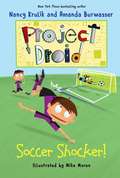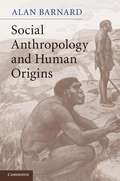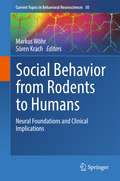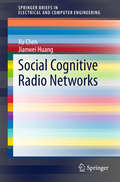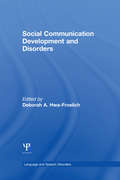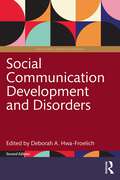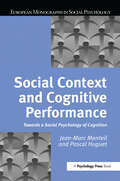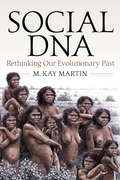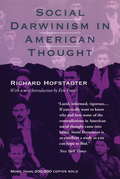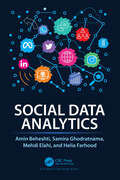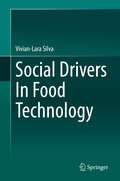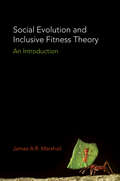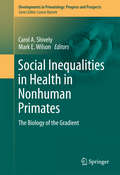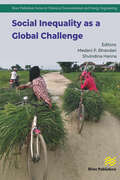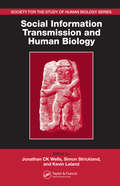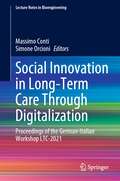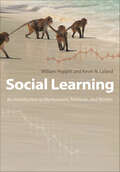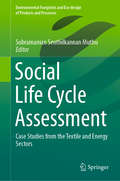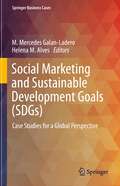- Table View
- List View
Soccer Shocker!: Project Droid #2 (Project Droid)
by Nancy Krulik Amanda Burwasser Mike MoranWhen Mom tells Logan that Java is joining his soccer team, the Purple Wombats, he’s not thrilled. It’s a lot of work teaching his new robot cousin how to act like a human-and keeping him out of trouble-and Logan needs a break.Still, being programmed for success means that Java’s also great at scoring. He might just turn the Wombats into a championship team, beating Sherry and Jerry Silverspoon and their Red Polar Bears . . . if he’d just let the other kids play, too. After being replaced as the Wombats’ MVP, Logan’s had enough.But when Java gets wet and goes on the fritz, can the whole team-even a short-circuiting Java-come together to score the winning goal?The second in a fantastically funny new chapter book series by internationally bestselling author Nancy Krulik and her daughter, Amanda Burwasser, Soccer Shocker is destined to win tons of fans.Sky Pony Press, with our Good Books, Racehorse and Arcade imprints, is proud to publish a broad range of books for young readers-picture books for small children, chapter books, books for middle grade readers, and novels for young adults. Our list includes bestsellers for children who love to play Minecraft; stories told with LEGO bricks; books that teach lessons about tolerance, patience, and the environment, and much more. While not every title we publish becomes a New York Times bestseller or a national bestseller, we are committed to books on subjects that are sometimes overlooked and to authors whose work might not otherwise find a home.
Social Anthropology and Human Origins
by Alan BarnardThe study of human origins is one of the most fascinating branches of anthropology. Yet it has rarely been considered by social or cultural anthropologists, who represent the largest subfield of the discipline. In this powerful study Alan Barnard aims to bridge this gap. Barnard argues that social anthropological theory has much to contribute to our understanding of human evolution, including changes in technology, subsistence and exchange, family and kinship, as well as to the study of language, art, ritual and belief. This book places social anthropology in the context of a widely-conceived constellation of anthropological sciences. It incorporates recent findings in many fields, including primate studies, archaeology, linguistics and human genetics. In clear, accessible style Barnard addresses the fundamental questions surrounding the evolution of human society and the prehistory of culture, suggesting a new direction for social anthropology that will open up debate across the discipline as a whole.
Social Behavior from Rodents to Humans
by Markus Wöhr Sören KrachThis compelling volume provides a broad and accessible overview on the rapidly developing field of social neuroscience. A major goal of the volume is to integrate research findings on the neural basis of social behavior across different levels of analysis from rodent studies on molecular neurobiology to behavioral neuroscience to fMRI imaging data on human social behavior.
Social Behaviour
by Tamás SzékelyHumans live in large and extensive societies and spend much of their time interacting socially. Likewise, most other animals also interact socially. Social behaviour is of constant fascination to biologists and psychologists of many disciplines, from behavioural ecology to comparative biology and sociobiology. The two major approaches used to study social behaviour involve either the mechanism of behaviour - where it has come from and how it has evolved, or the function of the behaviour studied. With guest articles from leaders in the field, theoretical foundations along with recent advances are presented to give a truly multidisciplinary overview of social behaviour, for advanced undergraduate and graduate students. Topics include aggression, communication, group living, sexual behaviour and co-operative breeding. With examples ranging from bacteria to social mammals and humans, a variety of research tools are used, including candidate gene approaches, quantitative genetics, neuro-endocrine studies, cost-benefit and phylogenetic analyses and evolutionary game theory.
Social Butterflies (Monographs in Population Biology #120)
by Henry S. HornAn ecologist's investigation of the social lives of butterfliesThroughout his career, Henry Horn took a unique approach to the study of butterflies. This book brings together his findings with recent advances in behavioral ecology to provide an incomparable look at the social lives of butterflies, illuminating for the first time the marvelously diverse range of butterfly behaviors across several species.Social Butterflies features in-depth studies of five sympatric species—the Plain Ringlet, the Eyed Brown, the Great Spangled Fritillary, the Viceroy, and the Pearly Eye—showing how their social interactions span much of the range of behaviors observed in vertebrates. Drawing on decades of his own keen observations in the field, Horn describes the natural history and behavioral peculiarities of each species and develops models to explain characteristic aspects of their behaviors. He then emphasizes key departures from these models to challenge the notion that butterflies are simply preconditioned to react to stimuli, showing how some make decisions by observing how other butterflies interact with the landscape and each other. Along the way, he sheds light on butterfly territoriality, mating tactics, vagrancy, feeding strategies, and more.Charting new directions for future research, Social Butterflies poses intriguing questions about the complex and sometimes mystifying social behaviors of these marvelous creatures, making it essential reading for lepidopterists, ecologists, and anyone interested in the social behaviors of invertebrate species.
Social Cognitive Radio Networks
by Xu Chen Jianwei HuangThis brief presents research results on social cognitive radio networks, a transformational and innovative networking paradigm that promotes the nexus between social interactions and cognitive radio networks. Along with a review of the research literature, the text examines the key motivation and challenges of social cognitive radio network design. Three socially inspired distributed spectrum sharing mechanisms are introduced: adaptive channel recommendation mechanism, imitation-based social spectrum sharing mechanism, and evolutionarily stable spectrum access mechanism. The brief concludes with a discussion of future research directions which ascertains that exploiting social interactions for distributed spectrum sharing will advance the state-of-the-art of cognitive radio network design, spur a new line of thinking for future wireless networks, and enable novel wireless service and applications.
Social Communication Development and Disorders
by Deborah A. Hwa-FroelichThis new standout volume is the first to describe developmental areas associated with social competence and social communication, as well as provide evidence-based information on effective assessment and intervention for children who have problems with social communication and social interactions. Expertly crafted, the volume offers both theory and practice within one comprehensive, yet manageable resource for busy professionals. The first section covers social communication theory and associated developmental domains. Case studies are provided to exemplify how different variables may affect social communication development. The second section covers evidence-based practices for social communication disorders and includes case studies, incidence and prevalence estimates, the current DSM-V definition of the disorder, referral guidelines, recommended practices of assessment and intervention, and a list of clinical resources. Social Communication Development and Disorders is an ideal text for a range of courses in Communication Sciences and Disorders or Speech-Language Pathology, and a must-have reference for professionals working with children with social competence or social communication problems, including speech-language pathologists (SLPs), regular and special educators, psychologists, and support personnel such as social workers, counselors, and occupational therapists.
Social Communication Development and Disorders (Language And Speech Disorders Ser.)
by Deborah A. Hwa-FroelichSocial Communication Development and Disorders examines the integrated development of social, linguistic, and cognitive functions. It provides evidence-based clinical information on effective assessment and intervention for individuals with social communication disorders. The second edition of this standout text is fully updated to reflect up-to-date research evidence and the application of the International Classification of Functioning, Disability and Health (Children and Youth version), and places a strong focus on cultural differences in social communication and extended developmental information from birth to adulthood. Part 1 explores topics including theoretical perspectives on social communication, neuroscience of social communication and social cognitive, social emotional, and social communication development. Part 2 covers social pragmatic communication disorder and associated disorders such as language impairment, autism spectrum disorder, attention deficit disorder and disruptive behavior disorder. Chapters feature case studies, incidence/prevalence estimates, DSM-5 definitions, referral guidelines, recommended assessment and intervention practices, as well as a list of clinical and instructional resources. This comprehensive and practical text is essential reading for both undergraduate and graduate students of communication sciences, speech and language disorders, as well as speech-language pathology. It is also an excellent reference for professionals working with individuals with social competence or social communication problems, including speech-language pathologists, teachers, psychologists, social workers, counsellors, school nurses, behavioral therapists, and occupational therapists.
Social Constructions of Water Quality in South Africa: A case study of the Blesbokspruit River in the Context of Acid Mine Drainage Treatment
by Suvania NaidooThis book details how the water quality of the Blesbokspruit River in Gauteng, South Africa was socially constructed by stakeholders and key individuals in the context of acid mine drainage (AMD) and its treatment. Social constructionism is used as the framing for this research to explain how water is intrinsically social. Findings presented here show that stakeholders are aware that the changes in the physicality of the Blesbokspruit resulted from human interventions and varied uses of the water over the years. Such knowledge, among factors such as the historical context of mining, current coal mining, flows and volumes of water, technology used and processes followed, information and communication, and vested interests influence social constructions of the water quality. What counts as the truth about water varies depending on the individual’s perspective, their purpose, and their individual interests. Further, how one defines water quality influences what treatment processes are preferred in order to improve water quality. The book explains why, for example, a treatment process meant to improve water quality gained a bad reputation by the public because of the South African government’s silo approach. The book explains how these social constructions are entrenched in power relations between stakeholders regarding AMD treatment and illustrates how power was used to influence decisions to improve the water quality of the Blesbokspruit. The case presented in this book offers insights and recommendations for policymakers working in water governance, including means to influence social constructions of water quality and ways to clarify roles and responsibilities in pursuit of improved cooperative government.
Social Context and Cognitive Performance: Towards a Social Psychology of Cognition (European Monographs in Social Psychology)
by Pascal Huguet Jean-Marc MonteilBased on twenty years of research on the social regulation of academic performances, this book offers theoretical and empirical arguments in favour of the inclusion of the social dimension of human beings as essential for their cognitive activities. We all engage in social interactions, compare ourselves with other people, belong to social groups, and are the object of a myriad of categorisations. Not only do such social experiences affect cognition, but they actually determine its form and its content. Several experiments indeed reveal that cognitive performance depends on the relationship between the individual and the social context in which cognition takes place. And this relationship is not forged directly by features of the situation, but rather by personal construals of these features (most notably social comparison). This fact alone justifies granting the individual's social experiences a psychological status and it further strengthens the key idea of this book, namely that the social context only exists through the intervention of cognitive processes of contextualization (producing a "cognitive context of the self") such as those involved in autobiographical memory. A "social psychology of cognition" is suggested, in which the fashionable distinction between cognition and social cognition makes no sense. From this innovative perspective it is indeed more the social nature of the individual rather than that of the object to be processed that defines the social nature of cognition. Well-known phenomena such as social facilitation and social loafing as well as established educational practices are also re-examined from this perspective.
Social DNA: Rethinking Our Evolutionary Past
by M. Kay MartinWhat set our ancestors off on a separate evolutionary trajectory was the ability to flex their reproductive and social strategies in response to changing environmental conditions. Exploring new cross-disciplinary research that links this capacity to critical changes in the organization of the primate brain, Social DNA presents a new synthesis of ideas on human social origins – challenging models that trace our beginnings to traits shaped by ancient hunting economies, or to genetic platforms shared with contemporary apes.
Social Darwinism in American Thought
by Richard HofstadterSocial Darwinism in American Thought portrays the overall influence of Darwin on American social theory and the notable battle waged among thinkers over the implications of evolutionary theory for social thought and political action. Theorists such as Herbert Spencer and William Graham Sumner adopted the idea of the struggle for existence as justification for the evils as well as the benefits of laissez-faire modern industrial society. Others such as William James and John Dewey argued that human planning was needed to direct social development and improve upon the natural order. Hofstadter's classic study of the ramifications of Darwinism is a major analysis of the social philosophies that animated intellectual movements of the Gilded Age and the Progressive Era.
Social Data Analytics
by Amin Beheshti Samira Ghodratnama Mehdi Elahi Helia FarhoodThis book is an introduction to social data analytics along with its challenges and opportunities in the age of Big Data and Artificial Intelligence. It focuses primarily on concepts, techniques and methods for organizing, curating, processing, analyzing, and visualizing big social data: from text to image and video analytics. It provides novel techniques in storytelling with social data to facilitate the knowledge and fact discovery. The book covers a large body of knowledge that will help practitioners and researchers in understanding the underlying concepts, problems, methods, tools and techniques involved in modern social data analytics. It also provides real-world applications of social data analytics, including: Sales and Marketing, Influence Maximization, Situational Awareness, customer success and Segmentation, and performance analysis of the industry. It provides a deep knowledge in social data analytics by comprehensively classifying the current state of research, by describing in-depth techniques and methods, and by highlighting future research directions. Lecturers will find a wealth of material to choose from for a variety of courses, ranging from undergraduate courses in data science to graduate courses in data analytics.
Social Drivers In Food Technology
by Vivian-Lara SilvaThis unique and timely text is designed to help food science students learn to perform critical analysis of food processing technology and consider the incorporation of elements that touch on contemporary technological developments in the food sector. As the food industry adjusts to new consumer demands for safe and low processed foods, the time has come to harmonize product and process engineering with ‘relationship engineering’ from farm to fork. This increasingly allows the opportunity for food sector professionals to consider the existence of new drivers of food consumption. These newly discovered drivers are explored in great detail over the course of this book from industrial, economic and human resource viewpoints. Social Drivers In Food Technology presents a series of helpful case studies are presented covering six important food sectors: chocolate, coffee, yogurt, juice, baby food and snacks. These cases have been chosen in order to illustrate dynamic and innovative advances in food processing technology. The information provided over the course of this book has been gained through the thorough study of both scientific literature and organizational reports from food processing companies. The major economic aspects related to food technology are also outlined throughout the text. This multidisciplinary approach is motivated by the opportunity to contextualize the technological debate in strategy and organizational economics, contributing to the formation of human resources. This text is informed by the concept that one must look beyond the technology of the food processing sector and discuss opportunities that involve re-thinking product innovation and process, knowledge generation and human resource training. These innovations have been highlighted in food science & technology literature, but their economic and managerial implications have remained unexplored until now. With its informative case studies, helpful illustrations and quizzes and comprehensive, well-organized scope, Social Drivers In Food Technology is a much-needed textbook that will allow students to look at food processing technology from both industrial and economic perspectives and to consider the important human resource elements involved.
Social Evolution and Inclusive Fitness Theory
by James A.R. MarshallSocial behavior has long puzzled evolutionary biologists, since the classical theory of natural selection maintains that individuals should not sacrifice their own fitness to affect that of others. Social Evolution and Inclusive Fitness Theory argues that a theory first presented in 1963 by William D. Hamilton--inclusive fitness theory--provides the most fundamental and general explanation for the evolution and maintenance of social behavior in the natural world.James Marshall guides readers through the vast and confusing literature on the evolution of social behavior, introducing and explaining the competing theories that claim to provide answers to questions such as why animals evolve to behave altruistically. Using simple statistical language and techniques that practicing biologists will be familiar with, he provides a comprehensive yet easily understandable treatment of key concepts and their repeated misinterpretations. Particular attention is paid to how more realistic features of behavior, such as nonadditivity and conditionality, can complicate analysis. Marshall highlights the general problem of identifying the underlying causes of evolutionary change, and proposes fruitful approaches to doing so in the study of social evolution.Social Evolution and Inclusive Fitness Theory describes how inclusive fitness theory addresses both simple and complex social scenarios, the controversies surrounding the theory, and how experimental work supports the theory as the most powerful explanation for social behavior and its evolution.
Social Inequalities in Health in Nonhuman Primates
by Carol A. Shively Mark E. WilsonThis book provides a comprehensive look atnonhuman primate social inequalities as models for health differences associated with socioeconomic status in humans. The benefit of the socially-housedmonkey model is that it provides the complexity of hierarchical structure andrank affiliation, i. e. both negative and positive aspects of social status. Atthe same time, nonhuman primates are more amenable to controlled experimentsand more invasive studies that can be used inhuman beings toexamine the effects of low status on brain development, neuroendocrinefunction, immunity, and eating behavior. Because all of these biological andbehavioral substrates form the underpinnings of human illness, and are likelyshared among primates, the nonhuman primate model can significantly advance ourunderstanding of the best interventions in humans.
Social Inequality as a Global Challenge (River Publishers Series In Chemical, Environmental, And Energy Engineering Ser.)
by Medani P. Bhandari Shvindina HannaThis book discusses the factors behind the inequalities embedded within our social, economic and political systems. Social inequalities are especially seen in the service sectors – in the differences of access to healthcare, education, social protection, housing systems, childcare, elderly care etc. Cultural inequality, which segregates people from the mainstream based on recognition problems with a specific groups’ social status, language, religion, customs and norms, is another widespread issue. This book tries to present an accurate picture of these issues with cases studies from various countries. Mostly, when we talk about inequality, the focus is on economic inequality; however, much inequality persists, especially discrimination due to gender, age, origin, ethnicity, disability, sexual orientation, class, and religion. To end this situation there is a need for social, economic, and political reform. Until or unless the marginalized groups are empowered, the inequality issue cannot be solved or even minimized. On the basis of various case studies, this book encourages us to rethink societal development through the lens of growing inequalities and disparities. The book presents new insights for evaluating the progress on social development. The book highlights the current challenges of social inequality. In combination this collection of edited papers gives an integrated understanding of the question of “why is society unequal”? This book is aimed at those stakeholders, who want to make or contribute to change and build an undivided, socially inclusive society, and to those who want to contribute to empowering society in the Twenty-First century.
Social Information Transmission and Human Biology (Society for the Study of Human Biology)
by Kevin Laland Jonathan Ck Wells Simon StricklandRecent research has emphasized that socially transmitted information may affect both the gene pool and the phenotypes of individuals and populations, and that an improved understanding of evolutionary issues is beneficial to those working towards the improvement of human health. In response to a growing interest across disciplines for information regarding the contribution of social behavior to a range of biological outcomes, Social Information Transmission and Human Biology connects the work of evolutionary theorists and those dealing with practical issues in human health and demographics. Combining evolutionary models with biomedical research, authors from various disciplines look at how human behavior influences health, and how reproductive fitness sheds light on the processes that shaped the evolution of human behavior. Both academic and medical researchers will find much useful insight in this text.
Social Innovation in Long-Term Care Through Digitalization: Proceedings of the German-Italian Workshop LTC-2021 (Lecture Notes in Bioengineering)
by Simone Orcioni Massimo ContiThis book gathers extended contributions to the workshop on Long-Term Digital Care, LTC-2021, organized by the Università Politecnica delle Marche (UNIVPM), Ancona, Italy, and the Hochschule Konstanz (HTWG), Germany, in November 2021, and funded by the DAAD Joint Mobility Program. It covers innovative, practice-oriented approaches that are expected to foster digital health care, with a special focus on improving internationalization and accessibility. The book, which bridges between technological and social disciplines, reports on selected studies with the main goals of: establishing a comparison of Long-Term Digital Care approaches, with focus on exchange and networking processes; defining practical roadmaps for digital social innovation; establishing concepts and methods for process evaluation and sustainability. It offers a timely snapshot on technologies for patient monitoring and assistant systems, medical data analysis and image processing, digital platforms and advanced diagnostics techniques, and discusses important concepts relating to traceable process evaluation, networking and accessibility. It aims at informing, yet it is also intended to inspire and foster a stronger collaboration across disciplines, countries, as well as academic and professional institutions.
Social Justice, Multicultural Counseling, and Practice: Beyond a Conventional Approach
by Heesoon JunThis third edition book offers a paradigm shift in thinking (from binary to complex) and enables visibility for the intersectionality of multiple identities that range from privileged to oppressed. For example, real people’s heterogeneous racial identities within the same racial group are visible. A paradigm shift in learning (from conceptual to transformative) connects conceptual learning (cognition) to their experience (affect). “…. transformation does not simply emerge due to the individual’s awareness…. but is experienced” (Benetka & Joerchel, 2016, p. 22). Uncensored first-person (subjective) written responses to specific questions to access unconscious and implicit bias will connect the writer’s experience to conceptual learning of diversity, equity, and inclusion. Writing in third person (objective) interrupts the transformative aspect by bypassing the accessibility of inner experience. Writing in first-person connects the writer to their experience which allows the unconscious to be accessed if it is practiced on a regular basis. This book is for everyone who wants to implement diversity, equity, and inclusion measures by learning to access their unconscious bias. Understanding social justice and equity and good intentions alone do not lead to accessing unconscious bias.
Social Learning: An Introduction to Mechanisms, Methods, and Models
by Kevin N. Laland William HoppittMany animals, including humans, acquire valuable skills and knowledge by copying others. Scientists refer to this as social learning. It is one of the most exciting and rapidly developing areas of behavioral research and sits at the interface of many academic disciplines, including biology, experimental psychology, economics, and cognitive neuroscience. Social Learning provides a comprehensive, practical guide to the research methods of this important emerging field. William Hoppitt and Kevin N. Lala define the mechanisms thought to underlie social learning and demonstrate how to distinguish them experimentally in the laboratory. They present techniques for detecting and quantifying social learning in nature, including statistical modeling of the spatial distribution of behavior traits. They also describe the latest theory and empirical findings on social learning strategies, and introduce readers to mathematical methods and models used in the study of cultural evolution. This book is an indispensable tool for researchers and an essential primer for students.Provides a comprehensive, practical guide to social learning researchCombines theoretical and empirical approachesDescribes techniques for the laboratory and the fieldCovers social learning mechanisms and strategies, statistical modeling techniques for field data, mathematical modeling of cultural evolution, and more
Social Life Cycle Assessment: Case Studies from the Textile and Energy Sectors (Environmental Footprints and Eco-design of Products and Processes)
by Subramanian Senthilkannan MuthuThis book highlights the Social Life Cycle Assessment (SLCA) of the energy and textile sectors. It also presents a range of models, indices, impact categories, etc. for SLCA that are currently being developed for industrial applications. Though SLCA was introduced in 2010, it is still relatively new compared to environmental life cycle assessment (ELCA).
Social Life in the Insect World
by Jean Henri FabreFabre had many scholarly achievements. He was a popular teacher, physicist, chemist, and botanist. However, he is probably best known for his findings in the field of entomology, the study of insects, and is considered by many to be the father of modern entomology. Much of his enduring popularity is due to his marvelous teaching ability and his manner of writing about the lives of insects in biographical form.
Social Marketing and Sustainable Development Goals: Case Studies for a Global Perspective (Springer Business Cases)
by M. Mercedes Galan-Ladero Helena M. AlvesThis book presents high-quality cases on different social marketing campaigns that have been developed by NGOs, Public Administration, and businesses. They will be specifically focused on achieving, or contributing to achieving, the different Sustainable Development Goals (SDGs) by The United Nations, and how these campaigns can raise awareness and contribute to achieving the SDGs. This book takes an international approach, gathering cases developed in different countries and cultures around the world.
